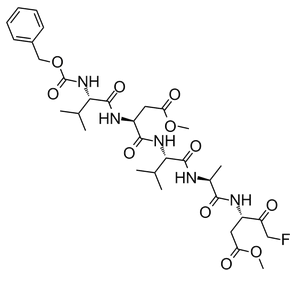Z-VDVAD-FMK
Z-VDVAD-FMK is a synthetic peptide that irreversibly inhibits the activity of caspase-2. It attenuates oxyhemoglobin-induced cleavage of PARP and apoptosis in endothelial cells.
≥98%
≥34.8 mg/mL in DMSO; insoluble in EtOH; insoluble in H2O. For obtaining a higher solubility, please warm the tube at 37°C and shake it in the ultrasonic bath for a while. Long term storage in solution is not recommended. Not stable in diluted solutions.
Jurkat T-lymphocytes treated with an irreversible caspase-2 inhibitor, benzyloxycarbonyl-Val-Asp(OMe)-Val-Ala-Asp(OMe)-fluoromethyl ketone (Z-VDVAD-FMK), or stably transfected with pro-caspase-2 antisense (Casp-2/AS) are refractory to cytochrome c release stimulated by etoposide1.
When etoposide-induced activation of pro-caspase-2 is subverted by Z-VDVAD-FMK or stable transfection of pro-caspase-2 antisense, cytochrome c release and other manifestations of apoptosis are attenuated.
OxyHb significantly activated both caspase-2 and caspase-3 in bovine brain microvessel endothelial cells. The irreversible caspase inhibitors Z-VDVAD-FMK (caspse-2 inhibitor) and Z-DEVD-FMK (caspase-3 inhibitor) significantly reduced cell detachment, caspase-2 and -3 activities, DNA ladders, and proteolytic cleavage of PARP2. Activation of caspase-2 and caspase-3 is essential for OxyHb induced apoptosis in endothelial cells, and Z-VDVAD-FMK and Z-DEVD-FMK have the potential to protect cells.
The minimal-length inhibitor of caspase-2, Z-VDVAD-fmk, which also inhibits caspases 3 and 73, prevented doxorubicin-induced nuclear apoptosis, but not cell death4.
1. J. D. Robertson, M. Enoksson et al. Caspase-2 Acts Upstream of Mitochondria to Promote Cytochrome c Release during Etoposide-induced Apoptosis. The Journal of Biological Chemistry. 277, :29803–29809, 2002
2. T. Meguro, B. Chen et al. Caspase Inhibitors Attenuate Oxyhemoglobin-Induced Apoptosis in Endothelial Cells, Stroke. 2001; 32:561-566.
3. Talanian, R. V., Quinlan, C., Trautz, S., Hackett, M. C., Mankovich, J. A., Banach, D., Ghayur, T., Brady, K. D., and Wong, W. W. (1997). Substrate specificity of caspase family proteases. J. Biol. Chem. 272, 9677–9682.
4. Gamen et al (2000) Doxorubicin treatment activates a Z-VAD-sensitive caspase, which causes Dym loss, caspase-9 activity, and apoptosis in Jurkat cells. Exp.Cell Res. 258 223.


